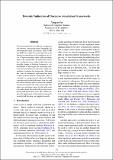Files in this item
Towards unification of discourse annotation frameworks
Item metadata
| dc.contributor.author | Fu, Yingxue | |
| dc.contributor.editor | Louvan, Samuel | |
| dc.contributor.editor | Madotto, Andrea | |
| dc.contributor.editor | Madureira, Brielen | |
| dc.date.accessioned | 2022-05-24T14:30:16Z | |
| dc.date.available | 2022-05-24T14:30:16Z | |
| dc.date.issued | 2022-05-25 | |
| dc.identifier | 279662676 | |
| dc.identifier | 489891bf-472d-4804-9fc8-41e424aa415b | |
| dc.identifier | 000828747900012 | |
| dc.identifier | 85149149531 | |
| dc.identifier.citation | Fu , Y 2022 , Towards unification of discourse annotation frameworks . in S Louvan , A Madotto & B Madureira (eds) , The 60 th annual meeting of the Association for Computational Linguistics : proceedings of the student research workshop . Association for Computational Linguistics , Stroudsburg, PA , pp. 132-142 , 60th Annual Meeting of the Association for Computational Linguistics (ACL 2022) , Dublin , Ireland , 22/05/22 . https://doi.org/10.18653/v1/2022.acl-srw.12 | en |
| dc.identifier.citation | workshop | en |
| dc.identifier.isbn | 9781955917230 | |
| dc.identifier.uri | https://hdl.handle.net/10023/25444 | |
| dc.description | Funding: The author is funded by University of St Andrews-China Scholarship Council joint scholarship (NO.202008300012). | en |
| dc.description.abstract | Discourse information is difficult to represent and annotate. Among the major frameworks for annotating discourse information, RST, PDTB and SDRT are widely discussed and used, each having its own theoretical foundation and focus. Corpora annotated under different frameworks vary considerably. To make better use of the existing discourse corpora and achieve the possible synergy of different frameworks, it is worthwhile to investigate the systematic relations between different frameworks and devise methods of unifying the frameworks. Although the issue of framework unification has been a topic of discussion for a long time, there is currently no comprehensive approach which considers unifying both discourse structure and discourse relations and evaluates the unified framework intrinsically and extrinsically. We plan to use automatic means for the unification task and evaluate the result with structural complexity and downstream tasks. We will also explore the application of the unified framework in multi-task learning and graphical models. | |
| dc.format.extent | 11 | |
| dc.format.extent | 296528 | |
| dc.language.iso | eng | |
| dc.publisher | Association for Computational Linguistics | |
| dc.relation.ispartof | The 60th annual meeting of the Association for Computational Linguistics | en |
| dc.subject | QA75 Electronic computers. Computer science | en |
| dc.subject | Artificial Intelligence | en |
| dc.subject | 3rd-DAS | en |
| dc.subject | NIS | en |
| dc.subject | MCC | en |
| dc.subject.lcc | QA75 | en |
| dc.title | Towards unification of discourse annotation frameworks | en |
| dc.type | Conference item | en |
| dc.contributor.institution | University of St Andrews. School of Computer Science | en |
| dc.identifier.doi | https://doi.org/10.18653/v1/2022.acl-srw.12 | |
| dc.identifier.url | https://aclanthology.org/volumes/2022.acl-srw/ | en |
This item appears in the following Collection(s)
Items in the St Andrews Research Repository are protected by copyright, with all rights reserved, unless otherwise indicated.

